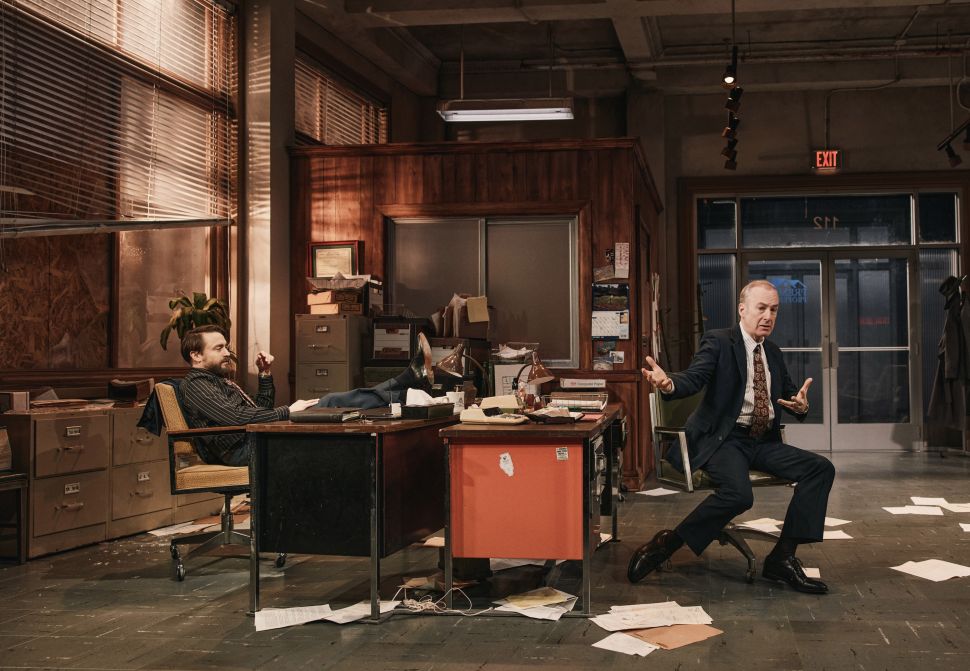You’ve seen the articles where researchers find a correlation between swearing and IQ: the more you curse, the smarter you are. Hell shitting ass damn right, say I. No doubt David Mamet, bard of potty-mouthed jags, would admit to being in possession of a galaxy brain. Does said genius status extend to the trash-talking salesmen of his 1983 watershed, Glengarry Glen Ross? Are they the brightest bulbs, these peddlers of subprime property to gullible Chicagoans? They cuss a blue mile, exchange f-bombs with the syncopated acumen of a jazz band. But these bastard sons of Willy Loman will always be dumb beasts in a zoo called capitalism.
The overarching joke of Mamet’s swift, two-act piece is that the men may jockey for supremacy on the office board which ranks who closed the most deals, but they’re all betas. Yes, we know the alpha-beta discourse is bunk, but it’s the sort of social Darwinism these mooks would endorse in a second. They prowl the jungle with their “leads” to find a mark to pounce on, sell them a Glengarry Highlands lot in Florida, puff the client up with machismo and a sense of destiny. That’s the predatory dance we watch at the end of the first act, as office hotshot Ricky Roma (Kieran Culkin) reels in James Lingk (John Pirruccello)—a bland fellow he just met in the Chinese restaurant near the office. “You get befuddled by a middle-class morality?” Ricky asks. “Get shut of it. Shut it out.” This nearly unbroken monologue over four pages touches on a central Mamet theme: action in the moment is all that matters; ethics, fate, fear of the future, that’s just talk. The scene ends with Roma pulling out a map of Florida and going in for the kill.
This scene ought to crackle with homosocial glee and a backwash of bile as we, like Lingk, swallow Roma’s dollar-store Ayn Rand jive. But the pitch doesn’t land—not on this side of the lights. Culkin’s manic adolescent persona works marvelously on Succession and the movie A Real Pain, but his casting as Roma is a roll that comes up snake eyes. In casting the talented but limited celebrity, director Patrick Marber and the producers invite us to wonder: What if Ricky Roma was obviously insecure and weaselly, alternately cringing and lashing out at those around him, a bit of prick but also a lost boy?
The comic persona Culkin has honed for years saps Roma’s jazz and bite. The character, indelibly preserved by Al Pacino in the 1992 film and in previous Broadway revivals by Bobby Cannavale and Liev Schreiber, has to be slick and confident. Cracks can show under pressure, but Roma is a shark. The Act I monologue as delivered by Culkin has no shape, no momentum or energy. It’s serious letdown after the strong preceding scenes (also in the restaurant) between office manager Williamson (Donald Webber, JR.) and struggling veteran Shelly (Bob Odenkirk), then bitterly resentful Moss (Bill Burr) coercing the aged, exhausted Aaronow (Michael McKean). We learn in those snapshots that there’s a sell-or-be-fired contest, and that Moss is plotting to rob the office and sell the leads to a competitor.
Culkin redeems himself somewhat in the second half, set in the ransacked office the next morning, since he has more personalities to bounce off. At this point, we’re essentially in a one-act workplace drama following three black-out sketches; a cop in a back office (Howard Overshown) interrogates the salesmen one by one as they strut and clash and gossip outside. Ricky has closed his deal with Lingk and won the first prize of a Cadillac; he doesn’t care who stole the leads. Aaronow is understandably jittery and Moss, after distributing fuck-yous to everyone in sight, leaves in a huff. Shelly returns, triumphant after selling $82k of property that he thinks will put him back on the board.
There’s plenty of great music the ensemble makes out of Mamet’s still-blistering script. Odenkirk’s Shelly takes some time to get cooking, but he captures the desperation and strangely innocent side of the huckster—not surprising qualities from the lead of Better Call Saul. There’s a balletic grace to Odenkirk’s slender frame as Shelly enacts the scene of his sale to a shut-in couple. As Williamson, the office tool who suffers the bulk of verbal abuse, Webber Jr. brings unexpected gravitas and quiet strength, eventually turning the tables on his tormentors.
The real discovery is Burr, who luxuriates in Mamet’s staccato fragments and torrents of profanity with natural ease. His sneering Boston accent a fine substitute for the Chicago inflection, Burr is alive up there, bursting with indignation and contempt for the business, his coworkers, himself. Although scrupulous precision with every word and bit of punctuation is required to pull off Mamet, Burr has a stand-up comedian’s looseness that suits Moss’s venomous, unhinged rants. Burr elevates every scene he’s in with his edgy discontent.
This is my third Glengarry revival in 20 years. It’s never not relevant. We love a bullshit artist; we love them to the White House. The casting, as it is here, may be uneven, but the message is still billboard size: Sell yourself and you’ll go far. Got a phone? Sell yourself on that. Always Be Closing. Oh, wait. That’s another version of Glengarry. One you can stream for a fraction of the cost of a Broadway ticket. You buy, you don’t buy, the same to me. I made my pitch.
Glengarry Glen Ross | 1hr 45mins. One intermission. | Palace Theatre | 160 West 47th Street | 844-753-7397 | Buy Tickets Here

